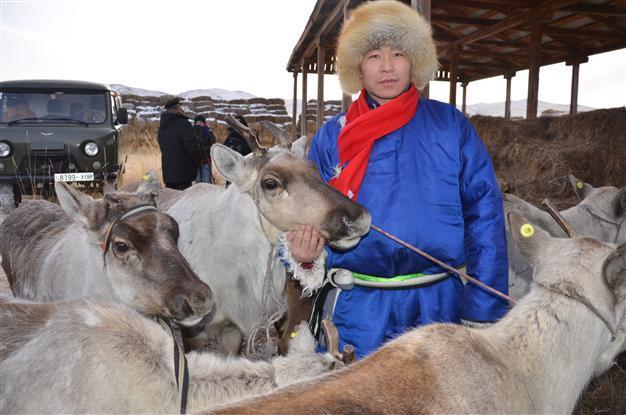Turkey’s cooperation agency delivers reindeers to Dukha Turks as New Year’s gift
MÖRÖN – Anadolu Agency

Kalan said the horns of the 19 reindeer were cut in order to avoid any complications during their transportation to Mörön. AA Photo
The Turkish Cooperation and Coordination Agency (TİKA) has given 19 reindeer as a New Year’s present to the Dukha Turks, who live in the northern-most part of Mongolia.
The Dukha Turks, who live in the province of Khövsgöl in Mongolia, which is about 700 kilometers from the country’s capital Ulan Bator, received 19 reindeer as a New Year’s present from TİKA.
Murat Karagöz, Turkey’s ambassador to Ulan Batur, said he was happy to deliver the reindeer in -39 Celsius degrees.
“We are happy to give to the Dukha Turks,” said Karagöz, adding that the delivery was realized with the orders of Prime Minister Ahmet Davutoğlu and TİKA Head Serdar Çam.
TİKA’s Ulan Bator Coordinator Ekrem Kalan said the Dukha Turks had asked for the reindeer for breeding purposes from them and they were happy and honored to help.
“The Dukha Turks will breed the reindeer that we brought from Russia’s Tuva region with their own reindeer to increase their size, and to make the reindeer live on in future generations,” said Kalan.
Kalan said the horns of the 19 reindeer were cut in order to avoid any complications during their transportation to Mörön.
The Dukha are a distinct tribe of Tyvan-lineage reindeer herders who have resided in Khövsgöl province since the borders between Russia and Mongolia were officially closed in 1947 at the start of the Cold War.
Today, only a total of 200 to 400 Dukha people making up 44 families remain. They ride, breed, milk and live off of reindeer, despite the fact the reindeer population has dropped to approximately 600 since the 1970s, when it was an estimated 2,000. Much of the Dukha’s income today comes from tourists who pay to buy their crafts and to ride their domesticated reindeer.
